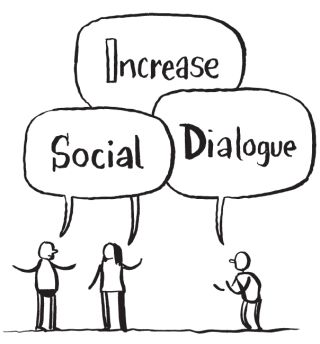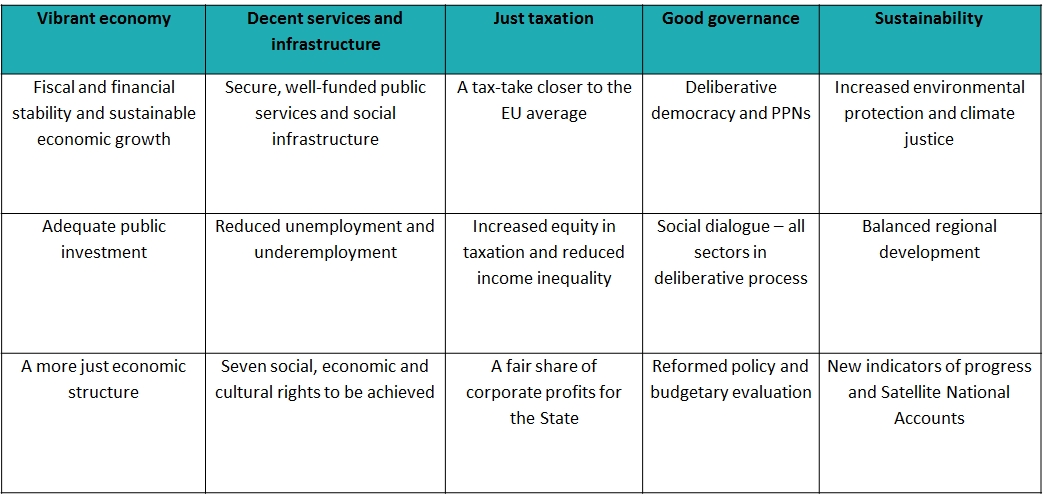Dealing with the diverse issues raised in the Local and European elections


Above is an outline of Social Justice Ireland's policy framework for a just Ireland which we believe provides a mechanism to address differing issues and challenges facing Ireland today. Our framework is built on the assumption that economic, environmental and social issues must be given equal consideration is we are to truly have a sustainable future. A detailed outline of each element of our framework is available in chapter 2 of our annual socio-economic review Social Justice Matters 2019. We provide an outline of each of the five pillars below.
i) Fostering a vibrant economy
One of the main expectations of citizens of a modern democracy is an economy that is not only well run but run in the interests of all society. Macroeconomic stability requires fiscal and financial stability, the support of a public investment programme of sufficient scale, and a more just structuring of Ireland’s economy. All these measures are connected. An investment programme will contribute to economic growth, which would in turn lower Ireland’s debt burden as a proportion of national income. If properly structured and well-targeted, it would also create the employment needed and produce the social infrastructure required to reduce inequality and deliver improved living standards in Ireland.
ii) Providing Decent Services and Infrastructure
Despite the economic gains of the last three decades or so, Ireland continues to trail our Western European counterparts in terms of service delivery and infrastructure investment. As a result, a deficit has emerged between Ireland and our peer countries of the EU-15. It should not need stating that this deficit cannot be closed without increasing our current levels of public investment. Gross capital expenditure was €9bn in 2008 and after years of severe cuts to this budget, it will be a projected €8.4bn in 2019. This is almost €800m more than had been planned for 2019 in the previous budget, and a significant step in the right direction. Government should continue to increase capital expenditure, particularly in light of the recent significant unexpected – and presumably temporary – windfalls in corporation tax which would be best used on once-off infrastructure projects. It is doubtful however that even this investment would be sufficient to eliminate Ireland’s infrastructure deficits any time soon. Social housing in particular requires very substantial investment over a long timeframe to be on the scale required to address current and future demand. Social Justice Ireland suggests that other methods may be required to finance such initiatives such as through a major cost rental programme in housing that would pay for itself over time and would not be on the Exchequer balance sheet.
iii) Just Taxation
If a country is setting social and economic goals, it is important that taxation policy supports these goals. Tax justice must be a key building block of any functioning model of development. Ireland needs to have a real debate about the levels of services and infrastructure it wishes to have in the coming decades, and how these are to be financed. The current trajectory of government policy is for reductions in total revenue (of which tax revenue is by far the largest component) as a percentage of national income and a corresponding reduction in expenditure. It is simply not possible to provide the high-quality public services Irish people aspire to having while failing to collect adequate revenue to pay for them. Allowing total expenditure to fall as a proportion of national income will only result in a greater infrastructure deficit compared to our EU counterparts. The re-emergence of economic growth should be seen as an opportunity to increase expenditure on our depleted social infrastructure, not to reduce taxes. A new development model is required; one that recognises that European-average levels of services and infrastructure cannot be delivered without European-average levels of taxation.
iv) Delivering Good Governance
It has been widely recognised that Ireland’s governance was poor in certain areas prior to the economic crisis. This is particularly so in relation to financial regulation. Moreover, the economic crisis led Government to make rash decisions, particularly in relation to fiscal policy. These decisions were often made without any consultation, and many have since been recognised as very damaging, particularly in the case of the bank guarantee. Reforming governance and widening participation must remain a key goal. There can be no return to the failed patterns of decision-making that led to the crisis. An increased recognition of the need to include all stakeholders in the decision-making process is needed.
v) Creating a Sustainable Future
Sustainable development is development which meets the needs of the present while not compromising the needs of the future. Financial and economic, environmental, and social sustainability are all key objectives and are all interlinked. To reflect this, Ireland needs new indicators measuring both wellbeing and sustainability in society, to be used alongside measures of national income like GDP, GNP and GNI. The use of such indicators would ensure that issues such as climate justice and balanced regional development, among other key indicators of wellbeing, are given the priority they deserve by policymakers. Our Sustainable Progress Index 2019 shows that while Ireland was ranked 2nd in the EU-15 in terms of economic growth, our environmental performance was below average. This points to policies that have prioritised economic growth above sustainability and this is an approach that cannot be allowed to continue.
The model for society outlined here and the policy framework underpinning it are based on a very simple premise: that we understand where we are as a society; that we can see where we want to go; and that there is a logical pathway that will get us there. Ireland has for too long been afflicted by a state of affairs whereby we understand the issues, we know what needs to be done to improve matters, yet we find ourselves failing to take the correct steps. It is time to change that.
To read more about our vision for Ireland and our policy framework for a just society click here.